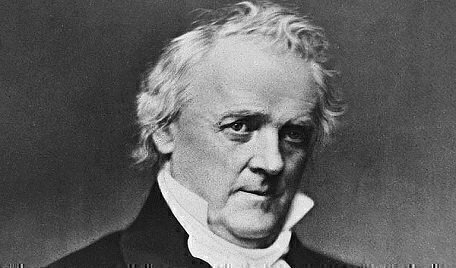April 23 marks the birthday of James Buchanan, the man regarded by many historians as one of the worst—if not the worst—Presidents of all time. So what did Buchanan do to earn the disrespect of so many people?

Today, most people know Buchanan for three things: He was single for his entire presidency; he’s the only President from Pennsylvania; and he was the President before Abraham Lincoln. It’s that final point that has been the lasting part of the Buchanan presidency, with his apparent indifference to the onset of the Civil War.
Of course, Lincoln was a hard act to precede or follow. And Buchanan came to the presidency under somewhat traditional but trying circumstances. He was a five-time member of the House of Representatives, secretary of state under President James Polk, and U.S. minister to Great Britain. At the Democratic convention in Cincinnati in 1856, Buchanan took the lead from the incumbent President, Franklin Pierce, on the first ballot and then battled Senator Stephen Douglas from Illinois for the presidential nomination. Buchanan won on the 17th ballot and defeated John C. Fremont, of the newly formed Republican Party, in the 1856 presidential election.
It was all downhill from there for President Buchanan. He became very sick and almost died from an illness that was spread throughout his hotel in Washington, where he traveled for meetings as President-elect.
In his inaugural address, Buchanan called the territorial issue of slavery “happily, a matter of but little practical importance." He had been tipped off about the Supreme Court’s decision in the Dred Scott v. Sandford case, which came shortly after the inauguration. Buchanan supported the theory that states and territories had a right to determine if they would allow slavery. (There were also reports Buchanan may have influenced the court’s ruling.) The Dred Scott decision angered and solidified Buchanan’s Republican opponents, and it drove a wedge into the Democratic Party. The country also went into an economic recession as the Civil War approached.
By 1860, it was apparent that Buchanan wasn’t going to be a candidate for re-election. Within three months after the election, seven states had left the Union as Buchanan remained as a lame-duck President until Lincoln could take office in March 1861. In his State of the Union message to Congress, Buchanan said he believed the South’s secession wasn’t legal, but the federal government didn’t have the power to stop it.
“All for which the slave States have ever contended, is to be let alone and permitted to manage their domestic institutions in their own way. As sovereign States, they, and they alone, are responsible before God and the world for the slavery existing among them. For this the people of the North are not more responsible and have no more fight to interfere than with similar institutions in Russia or in Brazil,” Buchanan said.
Buchanan also explained why he wasn’t actively involved in the secession battle as President. “It is beyond the power of any president, no matter what may be his own political proclivities, to restore peace and harmony among the states. Wisely limited and restrained as is his power under our Constitution and laws, he alone can accomplish but little for good or for evil on such a momentous question.” He had other issues during his presidency, including an obsession with Cuba and a controversy involving a war with Mormon settlers in the Utah territory.
Buchanan retired to his estate in central Pennsylvania and lived to see the end of the Civil War. Just before his death in 1868, he said, “History will vindicate my memory from every unjust aspersion.”







